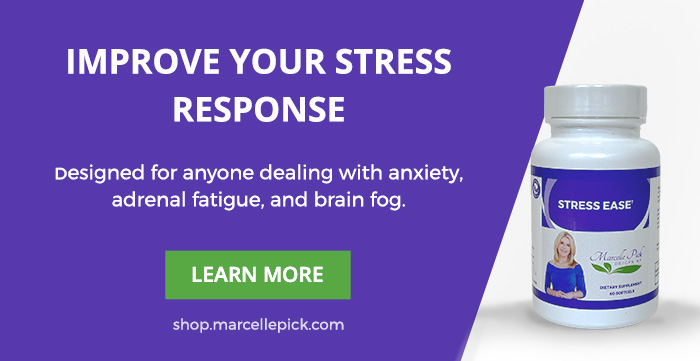Updated 09/10/2023
“I need help! My mother’s mental health is spiraling downward, and I don’t know how to support her.”
That’s what my friend, Jill, said when she called the other day. She’d first noticed her aging mother’s emotional decline during the height of the Covid 19 pandemic. Since then, her mother had moved twice, unhappy with the assisted living facilities she was in. Though restrictions are no longer in place, her mom was self-isolating, staying in her room most of the day.
Jill’s story isn’t unusual. During the pandemic, anxiety and depression skyrocketed. And those who already had mental health diagnoses really crashed. Even though three years have passed, the impacts are still being felt. .
That’s because anxiety and depression can be linked to hormonal imbalances brought on by stress. We were all under immense stress in 2020, and much of the resulting fear and uncertainty linger, even three years later.
The good news is, you don’t have to accept anxiety and depression as your new normal. The adrenal glands play a large role in balancing hormones properly, and balanced hormones may relieve the emotional strain so many people are facing.
Let me tell you about how your adrenal glands function, depression, and the link between the two. Then, I’ll give you some practical strategies for managing stress to help alleviate anxiety and depression.
The important functions of the adrenal glands
It’s important to first understand what your adrenal glands do. These small, triangular shaped glands, made up of the adrenal cortex and the adrenal medulla, sit on top of each kidney. The outside part, the cortex, produces hormones necessary to survive, including cortisol and aldosterone. The medulla produces other hormones, like adrenaline, that serve important functions, although you can survive without them.
One of the most important functions of the adrenal glands is to help you respond to stress. Most people have heard of adrenaline, and they understand that it helps prepare your body to spring into action in stressful situations.
Some of the other, less familiar, hormones are produced by the adrenals even when no obvious stressors are present. In fact, your adrenal glands must manufacture these hormones – you can’t live without them!
Cortisol is one of these vital hormones. Cortisol has a whole range of essential functions, including helping to manage the conversion of food to energy, helping regulate blood pressure and cardiovascular activity, decreasing inflammation and managing immune responses in the body.
Cortisol also triggers the “flight, fight or freeze” response which allows your body to respond appropriately to threats. When this response occurs, your body releases energy, sends your senses into high alert, and slows digestion. In other words, it shuts down functions that won’t impact immediate survival.
Here’s the problem…this response is supposed to be temporary. But when stress is constant, your adrenals may continually pump out cortisol, resulting in severely imbalanced levels. That means they aren’t making other hormones, which sets off a major chain reaction and causes numerous uncomfortable symptoms – including mood changes like depression and anxiety.
Internal stress causes as much damage as external stressors
Here’s something else a lot of people don’t realize: the stress that comes from inside causes as much trouble as external stressors. That’s why it’s essential to identify internal stress – especially these days – and do whatever you can to combat it.
During Covid, the stressors were clear: isolation, media reports about the dangers of Covid and how the world was responding, risking exposure if you had to go to work, losing your job, having children at home for schooling, bills piling up – all of these things were external stressors that most people can identify.
Now, those external concerns may not be there, but the stress lingers. Fear, guilt, anger, sadness, changes in job situations, a feeling that life will never be quite the same – it all adds up to a lot of internal stress.
And there may be new external stressors that can stir up internal stress from long ago! It’s so important to realize that all stress can have the same impact on your body – so it all needs to be addressed!
Understanding the Connection Between Depression and Stress
When Covid was a top concern, every person I talked to said they felt sadness, fear, or anxiety. But that’s not the depression I’m talking about here. Responding to major losses, like the ones we all experienced then, brings on sadness and grief – but depression is so much more than that.
Depression can’t be “pushed through” by ignoring it. Depression lasts a lot longer than a day or two, and trying to handle it simply by binge watching Netflix (which can be quite effective as a short term coping mechanism) could cause even more harm! While symptoms can range from very mild to severe, depression is a common, serious medical condition that impacts more than 300 million people worldwide, according to the World Health Organization.
Depression can cause changes in appetite, difficulty sleeping, fatigue and lack of energy, difficulty focusing, and, in severe cases, suicidal thoughts. I’ve heard from clients that depression causes feelings of hopelessness and despair, disconnection, and an inability to even get out of bed sometimes.
Connections between adrenal function and depression have been studied for since at least the late 1960s. In 2011, a review article summarized four decades of research on depression and Hypothalamic-Pituitary-Adrenal activation. Results of this review study were consistent in showing HPA hyperactivity as a link between depression and increased risk of other conditions, including dementia, diabetes, coronary heart disease and osteoporosis.
Research has demonstrated that cortisol levels differ in people living with depression. For instance, it peaks earlier in the day than in those without depression and does not decrease as it should in the afternoon or evening. This ongoing supply of stress hormones can exhaust the body and may cause a dip in neurotransmitters like serotonin, which can lead to depression.
It can become a vicious cycle, with elevated cortisol levels leading to depression, and depression bringing on elevated cortisol levels. It’s certainly complicated, but it is not hopeless, and medication isn’t necessarily the answer, despite the speed at which many conventional medical practitioners will pull out a prescription pad.
If stress is contributing to depression, there are certainly natural ways to address the problem and reduce cortisol production. Let’s take a look at a few now.
7 natural ways to relieve stress and keep depression at bay
The good news is, stress relief is easier now than it was during the worst of Covid. Businesses have reopened, so massages, yoga and meditation classes, and fun activities are once again possible. When looking to relieve stress, it’s vitally important that you find what works for you, especially if you feel depression beginning to take hold. Here are some ideas to get you started:
Do something you love every single day
I love to dance, so I try to go as often as possible. It was tough when public dances shut down, but I made sure to practice and look up new steps online so I could pick it up again when things reopened. It’s all too easy, once you let something go, to never get back to it. If that happened to you during Covid, get yourself back out there! The way you typically choose to spend free time can show you what’s important to you. Identify the things that bring an automatic smile to your face and hold onto them! Doing what you love is the perfect way to release tension and stress.
Pay close attention to lifestyle choices – diet, sleep and exercise
When stress is high -whether external or internal, it’s crucial to be sure you are doing everything you can to relieve physical stress on your body. Diet, sleep and exercise are three of the most important tools you have to support your adrenal function. All three help stabilize hormones which in turn stabilizes mood.
Avoid processed foods, caffeine, sugar and alcohol as much as you can. Fresh, organic fruits and vegetables and lean meats (locally sourced, if possible) should make up the bulk of what you are eating. Pay attention to when you are eating as well, to avoid spikes and dips in blood sugar levels. Balanced meals and snacks include protein, complex carbohydrates and healthy fats. And since it can be difficult to get all the nutrients your body needs from food, I recommend a daily multivitamin as well.
Sleep and exercise are both critical components in balancing hormones and stabilizing mood. A regular schedule for bedtime and waking, even if you have nowhere to go the next day, is best. Allow for 7-8 hours of sleep and establish a restful routine that will help you relax and drift off quickly. Research has shown that participating in regular exercise can boost energy and decrease fatigue as much as antidepressants do. But be careful not to overdo it, especially if your adrenals are already overtaxed. A walk around the block, online yoga or Pilates class, climbing up and down your stairs a few times, or a bike ride are all great ways to get yourself moving. But if none of those appeal to you, try something else – any movement works!
Clear your mind
Total relaxation is so hard to achieve if your mind is racing with questions and thoughts. So many women tell me the most stressful part of their day is when they lie down to sleep and are bombarded by all the thoughts they’ve pushed aside throughout the day. Now is a perfect time to try meditation, and there are plenty of apps to help you get started. Another approach is to allow yourself scheduled “worry time” where you don’t try to fight the anxious thoughts – but set a time, and when it rings, it’s time to let those worries go.
Get creative
Finding a creative outlet, whether art, music, photography or writing, can allow you to express all the feelings that could be contributing to inner stress in a productive way. No one has to see what you create unless you want to share it, so really let yourself go – you might just be surprised at what you can do!
Soak up the Sun
Sunlight is so important for boosting mood. Vitamin D boosts serotonin and improves mood naturally. Sunlight is a great way to boost your Vitamin D levels, as long as you let yourself get a couple hours of sun per week without blocking the UVB rays with sunscreen. 15 minutes each day is all it takes. If you live where the sun isn’t strong enough to allow your body to produce sufficient Vitamin D, consider taking a daily Vitamin D supplement.
Reach out for support
Something amazing that happened during the pandemic is the outpouring of support people offered to others. There were so many uplifting stories of someone helping another – even complete strangers. We can (and should) reach out for help, even when there’s no global crisis. It’s so important, especially when you feel depression pulling you down, to realize that you are not alone. Professional help is available, in person or by teletherapy, and friends can often give you a new perspective as well. It may also be important to talk to a trusted healthcare professional about how to manage hormonal imbalances that may be contributing to depression.
Find ways to be the helper
Fred Rogers often talked about looking for the helper in times of crisis. I think it applies any time. If you can be a helper to someone who is having a hard time, you may find that your depression subsides. Volunteer at a neighborhood clean up, animal rescue, food pantries, or any cause that is important to you.
Relieve stress to relieve depression
Stressful times are here to stay. Though we are no longer in the middle of a global crisis, things may never return to exactly the way they were before. And new issues crop up constantly – so it’s important to stay on top of it.
Jill helped her mother remember how much she loved music, and helped her find ways to enjoy listening to and playing music every day. She also found a therapist who would come right to the facility to help her mom process how she was feeling. She asked the staff to support getting her mom outside in the sunshine, and got her mom started on a daily multivitamin. All of it helped relieve the depression her mother had been feeling for far too long.
Depression can have dire consequences when not attended to. Noticing how stress impacts your life, and finding ways to treat yourself well is the first step towards feeling better. You have the power to relieve your stress and let your adrenal glands (and your mood) thrive!
If your depression is severe and you have thoughts of harming yourself, please call the national suicide prevention lifeline at 1-800-273-8255 or get to a hospital immediately.









